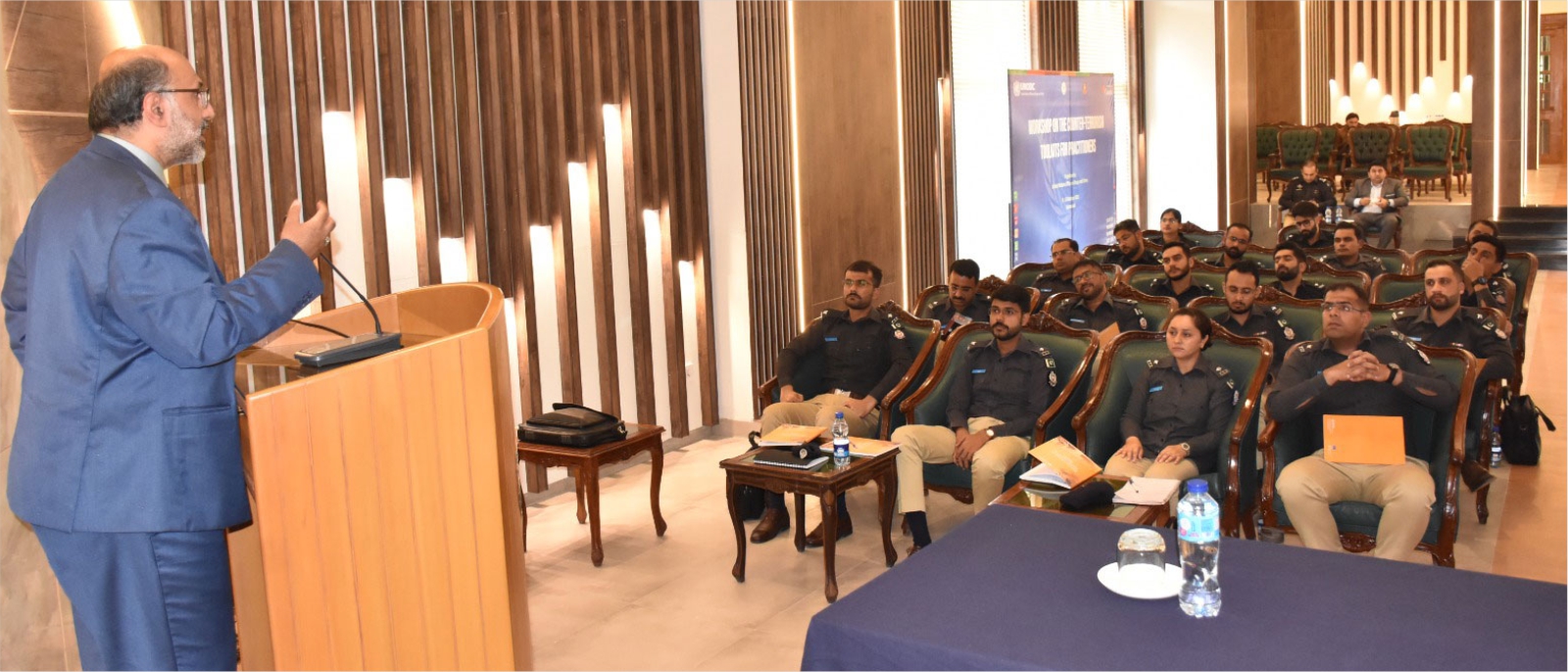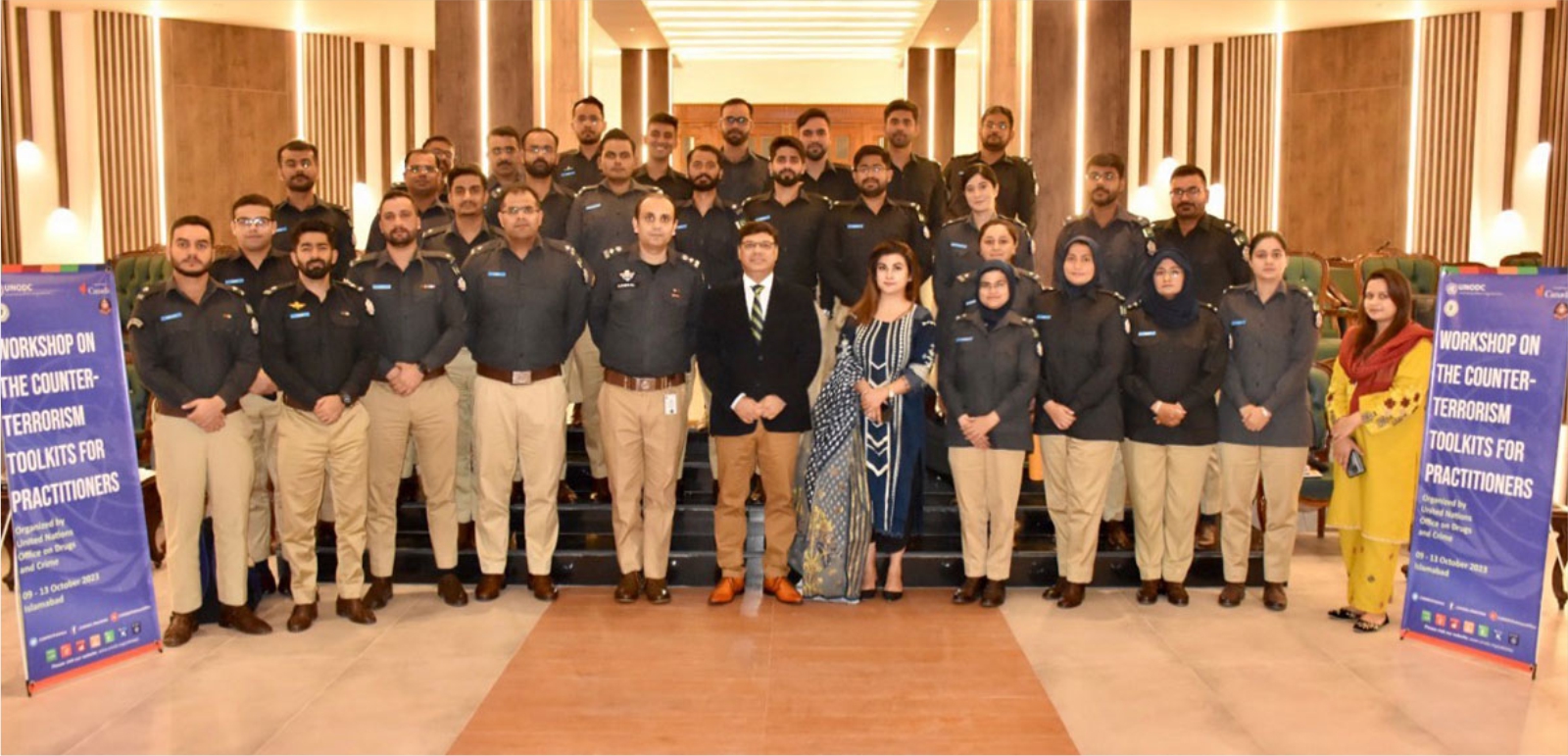
13 October 2023, Islamabad - In a determined effort to equip practitioners with the essential tools and knowledge to combat terrorism effectively, the United Nations Office on Drugs and Crime (UNODC) under its Country Programme-III (2022-2025) and Sub-Programme IV - Preventing and Countering Terrorism organized the "Workshop on Counter-Terrorism Toolkits for Practitioners" at the National Police Academy in Islamabad. In collaboration with National Counter Terrorism Authority (NACTA) and funded by Global Affairs Canada (GAC), this five-day workshop, held from 9 to 13, October 2023, brought together 34 professionals dedicated to counter-terrorism efforts from various regions.
The workshop began with an exploration of the differentiation of terrorist organizations based on various criteria, including their transnational, sub-national, regional, international, or sectarian nature. Participants delved into the complexities of these organizations, and the workshop emphasized the creation of standardized dossiers that provide crucial insights into the workings of terrorist and extremist groups.
One of the key highlights of the workshop was the focus on counter-terrorism department audits. Attendees had the opportunity to gain an in-depth understanding of these departments' profiles and components while examining standardized audit documents, both at the national and regional levels.The next segment concentrated on "Terrorism Cases as a Supervisor," where participants were introduced to comprehensive templates and checklists for various aspects of counter-terrorism, including investigation plans, crime scenes, forensics, detection, intelligence, interrogation, case files, trials, prosecution, and witness protection. The significance of understanding the financing of terrorism was also emphasized.
The importance of preventative tasks in counter-terrorism was evident, and the workshop addressed the linkage between prevention, detection, and intelligence through standardized tables and forms. Attendees engaged with documents such as the proscription checklist, the 4th Schedule checklist, and Standard Operating Procedures (SOPs) for databases used in prevention efforts.
Furthermore, participants delved into intelligence, learning about the collection and analysis of crucial information. SOPs for intelligence operations, projects, surveillance, monitoring, ground checks, and CT intelligence plans were discussed. Templates for mapping the nexus between crime and terrorism, surveillance SOPs, and district CT intelligence plan formats were presented.
The workshop also covered live and unfolding situations, providing participants with checklists for various operational scenarios. Attendees explored procedures for built-up area operations, open area operations, kidnapping for ransom operations, terrorism extortion, critical incident responses, and handling improvised explosive devices (IEDs), vehicle-borne IEDs (VBIEDs), and suicide vests. Lists related to CTD protection, officials, movements, buildings, and sources, as well as a "Not to-Do" list for operations and responses to terrorism incidents, were an essential part of this segment.
Participants also learned about the duties and responsibilities of a Sub-Divisional Police Officer (SDPO) in terrorism cases. The workshop concluded with discussions on core preemption work, encompassing the National Counter Terrorism Authority (NACTA) policy on countering violent extremism (CVE) and the draft law on CVE.
The closing ceremony provided an opportunity for all participants to reflect on the knowledge and insights gained during this intensive workshop. The "Workshop on Counter-Terrorism Toolkits for Practitioners" by UNODC, funded by GAC, represented a significant step forward in empowering practitioners to address terrorism effectively, ultimately contributing to national and global security.
